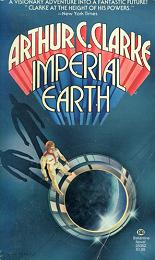
Imperial Earth
Arthur C. Clarke
305 pages
published in 1976
The last Arthur C. Clarke book I've read was Rendezvous with Rama back in 2002; unfortunately it was the news of his death that brought me to read another, as a private homage. I had read Imperial Earth before, in Dutch, as Machtige Aarde and liked it, though it never became a favourite. It seemed a good idea to reread this rather than one of the more obvious classic Clarke novels, to get a good idea of the strengths of Clarke's later works. Imperial Earth was written and published in 1976 and set three hundred years later, at the United States' quincentennial, which to be honest immediately dates it for me. On the other hand it is refreshing to read a sf novel that has the US still existing three hundred years in the future, rather than as subsumed into a world government or fallen apart into a Balkanised mess. At the very least setting the book at the quincentennial signals how much of a seventies book this is.
Imperial Earth starts on Titan where despite the harsh circumstances a flourishing colony has been established, which makes its living supplying hydrogen for interplanetary fusion rockets as the only place in the Solar System where hydrogen was abundant enough to be worthwhile to harvest and gravity light enough to be able to do it cheaply. It was through the drive and will of one man, Malcolm Makenzie, that the Titan colony became a reality and he and his family have ruled it since. That same drive meant that when it became clear he suffered from too much gene damage due to space travel to produce children the normal way, he instead let himself be cloned on Earth. His son did the same and Duncan Makenzie is the second generation of Makenzies to be born this way, now old enough to do the same himself and fortuitiously invited to the quincentennial celebrations of the birth of America.
The plot, such as it is, revolves around Duncan's trip to Earth but Imperial Earth's real story is about the relationship between Duncan and Karl Helmer, his slightly older best friend from his youth, son from another powerful Titan family dynasty and certified genius. Their relationship is shown in flashbacks all through the story. Karl was always the dominant personality in their relationship, slightly older, much smarter and much more worldwise. The defining point in their friendship comes with the arrival of Calindy, a young Earth woman who starts an affair with Karl but not with Duncan, who had also fallen in love with her and was of course already in love with Karl. When she left, Duncan's relationship with Karl is over as well. From that moment Karl changes, suffers a mental breakdown and withdraws in himself.
On Earth Duncan gets involved in unraveling a smuggling plot, as Titanite, an exotic, unreplicable mineral from Titan has been smuggled out to Earth. Though he at first refuses to believe it, Duncan slowly suspects Karl may have something to do with it. When he confronts him at the site of Earth's greatest telescope complex in Arabia, tragedy strikes as Karl, blinded by a sudden flash from the turning telescopes falls over the edge of the one they're on and to his death. Afterwards Duncan is made the custodian of his personal property, including his personal computer terminal, his minisec and it's through this that Duncan learns why Karl went to Earth and what he was working on: a method to reach possible extrasolar intelligences by sending very very long wave radio messages...
Though this is the central plot of the novel, much of Imperial Earth is bound up with other matters, providing a sort of travelogue of the Earth and Titan of 2276. The trip to Earth and technology used is described in loving detail, once on Earth Duncan gets to make all sorts of tourist trips to a museum like Manhattan as well as the resurfaced Titanic. It's all reasonably interesting if suspiciously like padding up a not too complicated plot, as is the subplot about the political ramifications for Titan of the new generation of much more efficient space drives comes online.
This is not the biggest problem of the book however, which is that the emotional core of the book is missing. The relationship between Duncan and Karl never really convinces. Each in their own way remains a coolly rational person, detached and emotionally flat and the one grand emotional gesture comes at the end of the novel, once Karl is safely dead, as Duncan presents his new son, a clone of Karl. Even this gesture is quickly replaced by Duncan's speculations about the kind of creatures Karl wanted to communicate with. Clarke never allows his characters to get out of control, to behave like anything but passionless scientists. It makes reading Imperial Earth a slightly dull experience, like eating a worthy but boring breakfast.